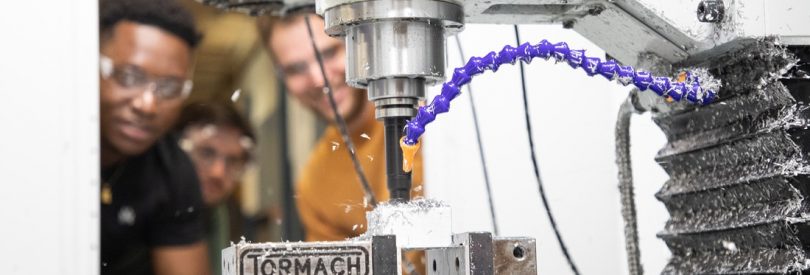
Note: A minimum grade of C is required for all courses in the curriculum.
University Requirement (2 hours)
GSTD 1002 – Freshman Seminar
General Education (18 hours)
English Composition (6 hours)
Fine Arts/Humanities (6 hours)
U.S. History/Government (3 hours)
Social Science (3 hours)
Note: 17 hours of mathematics, biological science, physical science, social science, and fine arts/humanities requirements are included in the major.
Chemistry (8 hours)
CHEM 1023 – University Chemistry I and CHEM 1021 – University Chemistry I Lab
CHEM 1123 – University Chemistry II and CHEM 1121 – University Chemistry II Lab
Physics (26 hours)
PHYS 2203 – University Physics I and PHYS 2201 – University Physics I Lab
PHYS 2213 – University Physics II and PHYS 2211 – University Physics II Lab
PHYS 3033 – Electromagnetism
PHYS 3053 – Modern Physics
PHYS 3113 – Advanced Physics Lab
PHYS 4013 – Optics
PHYS 4043 – Analytical Mechanics
PHYS 4053 – Quantum Mechanics
Engineering (30 hours)
ENGR 1023 – Introduction to Engineering and ENGR 1021 – Introduction to Engineering Lab
ENGR 1212 – Engineering Graphics
ENGR 2033 – Electrical Circuits I and ENGR 2031 – Electrical Circuits I Lab
ENGR 2143 – Statics
ENGR 3003 – Fluid Mechanics
ENGR 3013 – Thermodynamics
ENGR 3023 – Heat Transfer
ENGR 3043 – Mechanics of Materials
ENGR 3073 – Engineering Economics
ENGR 3101 – Solid Mechanics Lab
ENGR 3211 – Thermal Fluid Science Lab
ENGR 3163 – Computer-Aided Design and Analysis
ENGR 2020 – Engineering Exams *
*Engineering students must register for this course each fall and spring semester. It will be used as an exam period for all Engineering and Physics courses at the sophomore level and above.
Mathematics (19 hours)
MATH 1525 – Calculus I
MATH 1545 – Calculus II
MATH 2563 – Calculus III
MATH 2753 – Linear Algebra
MATH 3033 – Differential Equations
Computer Science (8 hours)
CSCI 2103 – Computer Science I and CSCI 2101 – Computer Science I Lab
CSCI 2113 – Computer Science II and CSCI 2111 – Computer Science II Lab
Electives (6 hours)
6 hours of upper-level Engineering, Physics, or Mathematics electives
Total Hours – 120
- 2025-2026
- 2024-2025
- 2023-2024 [pdf]
- 2022-2023 [pdf]
- 2021-2022 [pdf]
- 2020-2021 [pdf]
- 2019-2020 [pdf]
- 2018-2019 [pdf]
- 2015-2016 [pdf]
- 2014-2015 [pdf]
- 2013-2014 [pdf]
- 2012-2013 [pdf]
- 2011-12 [pdf]
- 2010-11 [pdf]
- 2009-10 [pdf]
| Department: | |
| Hours Required: | 120 |
| Categories: | Major, Undergraduate |
| Delivery: | On-Campus |
The Engineering Physics bachelor’s degree with science sub-plan is versatile and designed to provide students with a solid foundation in physics, mathematics and core engineering concepts, all of which are necessary to pursue graduate work in multidisciplinary complex areas. The curriculum leaves students with a variety of career choices. Graduates are able to seek innovative careers in industry, typically in research and development where problem-solving skills and an understanding of engineering are necessary, while at the same time, it provides a firm foundation for the pursuit of graduate studies in interdisciplinary engineering or physics topics at esteemed research universities. To name a few, our graduates may continue their education in advanced engineering and physics programs such as microelectronics, photonics, nuclear engineering, biomedical engineering, biophysics, radiation physics, nanotechnology or any discipline where the principles of physics are applied.
Learning Goals
- Our graduates effectively communicate scientific knowledge.
- Our graduates have the knowledge to make informed and ethical scientific decisions.
- Our graduates utilize appropriate quantitative skills in making decisions.
- Our graduates demonstrate the information literacy required for scientific study.
- Our graduates possess the knowledge and skills in engineering and the physical sciences to be successful.
